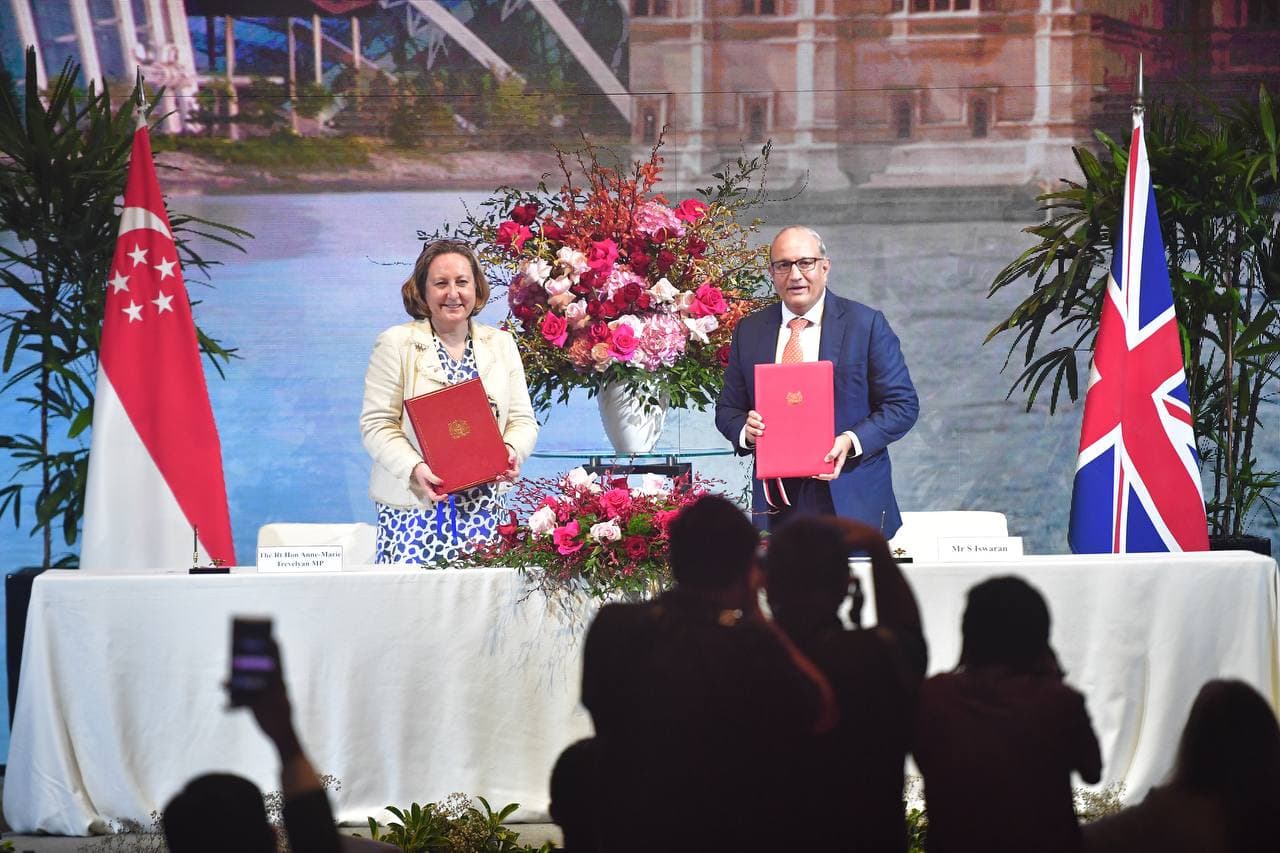Singapore, UK finalise digital economy deal to boost online trade and partnerships
Sign up now: Get ST's newsletters delivered to your inbox

Mr S. Iswaran, the Minister-in-charge of Trade Relations, and Ms Anne-Marie Trevelyan, Britain's Secretary of State for International Trade, at the signing ceremony to formalise the UK-Singapore Digital Economy Agreement.
ST PHOTO: DESMOND WEE
Follow topic:
SINGAPORE - Singapore and the United Kingdom on Friday (Feb 25) finalised a new digital-trade deal they had agreed on last December.
Mr S. Iswaran, the Minister-in-charge of Trade Relations, and Ms Anne-Marie Trevelyan, Britain's Secretary of State for International Trade, helmed the hybrid signing ceremony to formalise the UK-Singapore Digital Economy Agreement (UKSGDEA) at the JW Marriott Hotel Singapore South Beach.
While this is Singapore's fourth digital agreement, likely to come into force in the next few months, for Britain it is the first.
The UKSGDEA is also the first digital pact between an Asian and a European country.
The deal will boost existing digital trade between Singapore and Britain and provide new areas of partnership for businesses on both sides, ultimately ensuring their consumers are better served, said the Ministry of Trade and Industry.
In his address at the ceremony, Mr Iswaran said the two countries have already started looking into the next wave of cooperation.
That will include a detailed framework for green economy cooperation and an agreement - Mutual Recognition Agreement of Authorised Economic Operators - to expedite Customs clearances by this year.
Singapore is Britain's largest trade and investment partner in South-east Asia, while the UK is one of Singapore's top investment destinations in Europe.
Negotiations for the deal started in June last year, building upon the existing UK-Singapore Free Trade Agreement that came into force in February 2021.
"The expeditious conclusion of this cutting-edge agreement reflects strong trust between two like-minded and digitally progressive nations," said Mr Iswaran.
The new deal's key thrusts include encouraging digitalisation of the entire trading process, protecting data used and exchanged in trade deals, and facilitating a digital environment where smaller companies feel their transactions are secure and consumers are guarded against fraudulent, misleading or deceptive conduct online.
Mr Iswaran said that by enabling seamless digital trade, trusted data flows and secure digital environments, the UKSGDEA will enhance Singapore's and the UK's roles as trusted nodes in global value chains.
"This enables businesses to use us as digital gateways to access opportunities in Asia, Europe and indeed the world," he added.
That deal covers a thriving trade relationship worth more than £17 billion (S$30.6 billion). In 2019, bilateral services trade exceeded $22 billion, of which around 70 per cent could have been digitally delivered.
Ms Trevelyan said: “This digital agreement plays to our strengths as a services superpower and will ensure our brilliant businesses can build back better from the pandemic and benefit from easier, quicker and more trusted access to the lucrative Singapore market.”
In response to a question, she said both UK and Singapore will look into how they can engage businesses and encourage them to use the agreement to maximise economic benefits and create jobs.
Ms Trevelyan said: “This digital agreement plays to our strengths as a services superpower and will ensure our brilliant businesses can build back better from the pandemic and benefit from easier, quicker and more trusted access to the lucrative Singapore market.”
In response to a question, she said both UK and Singapore will look into how they can engage businesses and encourage them to use the agreement to maximise economic benefits and create jobs.
Singapore has concluded similar deals in the past two years, starting with the Digital Economy Partnership Agreement with Chile and New Zealand, the Singapore-Australia Digital Economy Agreement, and the Korea-Singapore Digital Partnership Agreement.
These unique trade agreements are aimed at aligning national digital rules and standards, facilitating interoperability between digital systems, supporting cross-border data flows, and safeguarding personal data and consumer rights.
They also encourage cooperation between Singapore's economic partners in nascent areas such as digital identities, artificial intelligence and data innovation.
The common frameworks and rules for digital trade are expected to enable companies in Singapore to connect digitally with their overseas partners more seamlessly, lower the cost of operations, increase efficiency and create more seamless and easier access to overseas markets.
Mr Iswaran said the agreement will facilitate a trusted and secure digital environment and promote participation in the digital economy by people and businesses.
"For example, online consumers will benefit from safeguards against fraudulent practices, while companies will receive protections for source codes," he noted.
Mr Chionh Chye Kit, chief executive and co-founder of Singapore-based Cynopsis, said: “We hope to leverage the Singapore DEAs to further our business expansion in UK and other countries."
His company offers regulatory technology solutions designed to digitise and automate compliance and regulatory processes.
Ms Yean Cheong, executive director at SGTech, an association of tech companies here, said: “The UKSDEA will help our businesses engage seamlessly with those in the UK. SGTech looks forward to working with the government and our counterpart associations in the UK to translate the agreement into actionable connections that our companies can leverage.”
His company offers regulatory technology solutions designed to digitise and automate compliance and regulatory processes.
Ms Yean Cheong, executive director at SGTech, an association of tech companies here, said: “The UKSDEA will help our businesses engage seamlessly with those in the UK. SGTech looks forward to working with the government and our counterpart associations in the UK to translate the agreement into actionable connections that our companies can leverage.”

